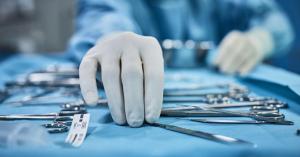Coronavirus cases are still on the rise all over the country — including within the U.S. military. Military personnel from the enlisted ranks all the way up to Defense Department leadership are testing positive for COVID-19, with a large uptick last week. The government is now scrambling to keep these troops safe and ensure they can be paid.
Thousands of troops in the U.S. military have now tested positive for the coronavirus. According to a report by The Military Times, the count passed over 5,000 last week, and according to The Federal News Network, the military reported 403 new cases in just one day. At least 817 military civilians have tested positive, as well as 653 dependents of service members, and 336 military contractors. So far, 19 members of the military have died from the global pandemic.
Videos by PopCulture.com
Pentagon leadership is reportedly working hard to slow or stop the spread of the virus within its ranks. The first step is similar to the treatment for the rest of the country — expanding testing and contact tracing to minimize how far a case can spread before it is contained. Army Gen. Mark Milley told The Military Times that that will begin with crews on Navy submarines and Air Force bombers, as well as basic trainees.
“Our desire, our aspiration is to expand testing, especially for groups that are probably going to be in tighter quarters,” Milley said.
Expanding testing is no simple issue, as experts have found even outside of the military. A report by Five Thirty-Eight notes that there are two basic kinds of tests for the virus — direct and indirect. Direct tests typically use samples of mucus to determine whether COVID-19 is present in the patient’s body, while indirect tests use blood to see if the patient has antibodies against the virus, meanign that they have had contact with it recently.
Right now, labs all over the U.S. are doing whatever testing they are equipped for — in most cases, direct PCR testing. However, these tests are not standardized, and the county’s testing capacity is being expanded as quickly as possible, not as efficiently as possible.
Meanwhile, experts say indirect tests are really vital for determining how widespread the virus is, and for examining how immunity to it builds up and how long it lasts. However, much of the indirect testing being done in the U.S. is of dubious quality, as the FDA has temporarily allowed companies to skip their rigorous approval step and begin administering tests right away.
“It’s the wild, wild west,” said Dr. Davey Smith of the University of California, San Diego. “I don’t want to belabor this and say it was a mistake [to move so quickly]. It’s not — Better to get tests out there even if some were marginally good. They were good enough for the moment. But now we need to figure out how we validate this.” For the latest information on the coronavirus pandemic, visit the websites of the CDC or the World Health Organization.









